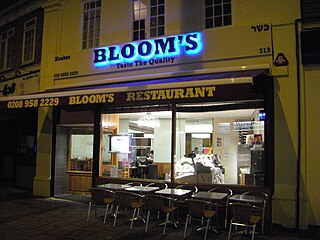
Borough Park is a neighborhood in the southwestern part of the borough of Brooklyn, in New York City. The neighborhood is bordered by Bensonhurst to the south, Dyker Heights to the southwest, Sunset Park to the west, Kensington and Green-Wood Cemetery to the northeast, Flatbush to the east, and Mapleton to the southeast.

A soup kitchen, food kitchen, or meal center is a place where food is offered to the hungry usually for no price, or sometimes at a below-market price. Frequently located in lower-income neighborhoods, soup kitchens are often staffed by volunteer organizations, such as church or community groups. Soup kitchens sometimes obtain food from a food bank for free or at a low price, because they are considered a charity, which makes it easier for them to feed the many people who require their services.

Midwood is a neighborhood in the south-central part of the New York City borough of Brooklyn. It is bounded on the north by the Bay Ridge Branch tracks just above Avenue I and by the Brooklyn College campus of the City University of New York, and on the south by Avenue P and Kings Highway. The eastern border consists of parts of Nostrand Avenue, Flatbush Avenue, and Coney Island Avenue; parts of McDonald Avenue and Ocean Parkway mark the western boundary.

Williamsburg is a neighborhood in the New York City borough of Brooklyn, bordered by Greenpoint to the north; Bedford–Stuyvesant to the south; Bushwick and East Williamsburg to the east; and the East River to the west. It was an independent city until 1855, when it was annexed by Brooklyn; at that time, the spelling was changed from Williamsburgh to Williamsburg.

Kehillas Yaakov Pupa is a Hasidic dynasty, named after the Yiddish name of the town of its origin.

Kugel is a baked casserole, most commonly made from lokshen or potato. It is a traditional Ashkenazi Jewish dish, often served on Shabbos and Jewish holidays. American Jews also serve it for Thanksgiving dinner.

Jewish cuisine refers to the worldwide cooking traditions of the Jewish people. During its evolution over the course of many centuries, it has been shaped by Jewish dietary laws (kashrut), Jewish festivals and holidays, and traditions centred around Shabbat. Jewish cuisine is influenced by the economics, agriculture, and culinary traditions of the many countries where Jewish communities have settled and varies widely throughout the entire world.

The Second Avenue Deli is a certified-kosher Jewish delicatessen in Manhattan, New York City. It was located in the East Village until December 2007, when it relocated to 162 East 33rd Street in Murray Hill. In August 2011, it opened a second branch at 1442 First Avenue on the Upper East Side. In November 2017, it opened a cocktail lounge called 2nd Floor above its Upper East Side branch.

Colel Chabad was founded in 1788 and is the oldest continuously operating charity in Israel. The institution runs a network of soup kitchens and food banks, dental and medical clinics, daycare centers, widow and orphan support, and immigrant assistance programs. It also provides interest-free loans, camp scholarships, career training and job placement, subsidized weddings for the poor, and many other social-welfare projects.

A kosher restaurant or kosher deli is an establishment that serves food that complies with Jewish dietary laws (kashrut). These businesses, which also include diners, cafés, pizzerias, fast food, and cafeterias, and are frequently in listings together with kosher bakeries, butchers, caterers, and other similar places, differ from kosher-style businesses in that they operate under rabbinical supervision, which requires the observance of the laws of kashrut, as well as certain other Jewish laws, including the separation of meat and dairy.
The Metropolitan Council on Jewish Poverty (Met Council) is a New York City-based non-profit social services organization. It offers many services to help hundreds of thousands of New Yorkers in need.

Thirteenth Avenue is a roughly 2.5-mile-long (4.0 km) street in the borough of Brooklyn in New York City. Thirteenth Avenue is the commercial center of the Brooklyn neighborhoods of Borough Park, and Dyker Heights.
Chabad hipsters are the cross-acculturated members of the Chabad Hasidic community and contemporary hipster subculture. Beginning from the late 2000s through the 2010s, a minor trend of cross acculturation of Chabad Hasidism and hipster subculture appeared within the New York Jewish community. The first printed reference to this trend was the 2007 New York Press cover story, "Hipster Hassids" by Alyssa Pinsker. Later, according to The Jewish Daily Forward, a significant number of members of the Chabad Hasidic community, mostly residing in Crown Heights, Brooklyn, appear to now have adopted various cultural affinities of the local hipster subculture.

American Jewish cuisine comprises the food, cooking, and dining customs associated with American Jews. It was heavily influenced by the cuisine of Jewish immigrants who came to the United States from Eastern Europe around the turn of the 20th century. It was further developed in unique ways by the immigrants and their descendants, especially in New York City and other large metropolitan areas of the northeastern U.S.

La Soupe is a Cincinnati, Ohio, nonprofit organization that uses discarded food to produce meals and delivers them to other nonprofit agencies for distribution to people experiencing food insecurity.

Basil Pizza & Wine Bar was a restaurant in the Crown Heights neighborhood of Brooklyn, New York.

Rethink Food NYC Inc, commonly called Rethink Food or just Rethink, is a non-profit organization based in New York City. The organization was founded to address hunger in the United States by contributing to a sustainable and equitable food system. Rethink collects excess food from restaurants, grocery stores, and corporate kitchens to provide nutritious meals for people living without food security at low or no-cost. The organization expanded its operations in March 2020 to meet growing food demands amid the COVID-19 pandemic in the United States.
Veretzky is the name of a Hasidic Jewish Rabbinical dynasty originating in Nyzhni Vorota, Ukraine, near the borders with Hungary and Slovakia. While the dynasty reestablished its court in the United States, a dynasty of the same name has been recently established in Israel as well.

Alta Faige Teitelbaum, known as the Satmar Rebbetzin, was a Polish-born American Hasidic community leader. Teitelbaum's status as Rebbetzin was gained through her marriage to the first Rebbe (leader) of the Satmar Hasidic community, Rabbi Joel Teitelbaum (1887–1979). After her husband's death, the Satmar Rebbetzin gained a following of supporters who stood in opposition to her husband's successor, the second Rebbe of Satmar, Rabbi Moshe Teitelbaum (1914–2006).
The Jewish-American working class consists of Jewish Americans who have a working-class socioeconomic status within the American class structure. American Jews were predominantly working-class and often working poor for much of American history, particularly between 1880 and the 1930s. During this period, Ashkenazi Eastern European Jewish immigrants constituted the majority of the Jewish-American working class. By the mid-1950s, the Jewish-American community had become predominantly middle class. Stereotypes commonly depict American Jews as fundamentally upwardly mobile and middle class to upper class. Despite the "imagined norm" that American Jews are "middle-class, white, straight [sic] Ashkenazi", many Jewish Americans are working class and around 15% of American Jews live in poverty.

















